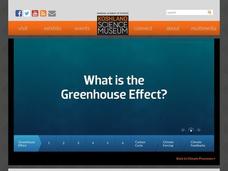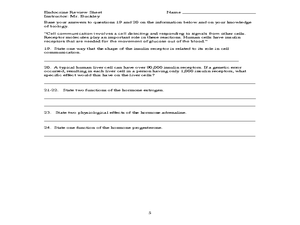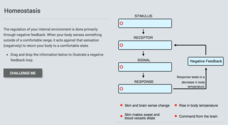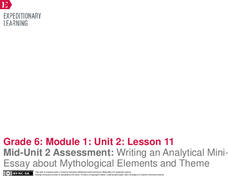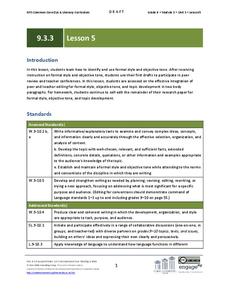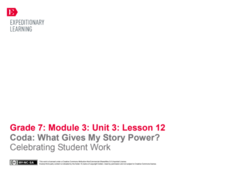National Academy of Sciences
What is the Greenhouse Effect?
The greenhouse effect warms up earth enough so it can support life, but if it heats up too much, life won't be able to survive. An interactive presentation covers the greenhouse effect, the carbon cycle, climate forcing, and climate...
EngageNY
Writing with Evidence: Percy and the Hero’s Journey (Chapter 7)
Read, set, write! Scholars participate in the first fully independent writing task of the unit as they write about how Percy’s experience in The Lightning Thief aligns with The Hero’s Journey. To begin their writing, they complete a...
EngageNY
Peer Critique for Organization and Style
Put another set of eyes on your class's historical fiction narratives with one of the final lessons in the unit. Fourth graders use feedback from their peers to annotate their drafts for revision, particularly their bold beginnings and...
NPR
Test and Evaluate the Prototype
Time to test the prototype. Groups test their prototypes to the plastics problem under consideration. The results of the tests and peer feedback offer a means to refine the prototype.
Brigham Young University
Problems? Working it Out
Working in pairs, set designers take turns sharing their sketches, explaining how their renderings articulate their concept, and receiving feedback on concerns and questions.
Curated OER
AC Negative Feedback Op-amp Circuits
In this electrical circuit activity, students draw a schematic design and build a op-amp model to show understanding of AC-negative feedback op-amp circuits before answering a series of 14 open-ended questions with schematics. This...
Curated OER
Cellular Respiration: Other Metabolites and Control of Respiration
The feedback mechanisms of metabolism of a variety of substances in the human body. Carbohydrates, lipids, amino acids, and their derivatives are explained. The biochemistry required to explain the metabolic balance and feedback controls...
Curated OER
Endocrine Review Sheet
Starting with a diagram of the kidneys and urinary tract of the human, this sheet has questions about excretion, blood concentrations of hormones, gland feedback mechanisms and the effects of some hormones.
CK-12 Foundation
Homeostasis
How much negative feedback does a body get daily? The interactive walks through one negative feedback loop, increasing body temperature. Then it challenges scholars to relate this to mechanical feedback loops and disorders that prevent...
Curated OER
Animal Structure and Function
Take a look at the levels of organization and methods of homeostasis in living things. This instructional activity requires biology enthusiasts to list categories of animal tissues, connective tissues, and muscle tissues. It has them...
Google
Sub Report
Receive clear feedback from substitute teachers with this easy-to-use template. With room for up to six class periods, substitutes are asked to grade and comment on each period, while also writing a general account of the day.
Curated OER
Positive Feedback Opamp Circuits
In this physics worksheet, students complete 12 short answer questions on opamp circuits. They also perform calculations of voltage in some items.
Coach My Video
CoachMyVideo Mobile: Easy Frame-Capture
Your class will be eager to improve their physical skills and bring their games to the next level after working with you and this app! Record your young athletes as they demonstrate their unique athletic abilities, and then review...
College Board
2011 AP® Psychology Free-Response Questions
A student is taking her first exam in Japanese. What are some factors that could affect her success? Learners consider the question, as well as examine a study on vision and feedback using authentic College Board materials.
EngageNY
Mid-Unit 2 Assessment: Writing an Analytical MiniEssay about Mythological Elements and Theme
Two is company. Scholars pair up to continue their mini essay writing from the previous lesson. They work on their introduction and conclusion paragraphs and then trade partners for peer feedback and a fresh set of eyes on their work....
EngageNY
Grade 9 ELA Module 3, Unit 3, Lesson 5
Class members examine examples that model how to develop and maintain a formal style and an objective tone in informative/explanatory writing. They also engage in a peer review activity and revise their work based on the feedback.
NASA
Revising an Investigation
Write, edit, and then revise! The fourth lesson in a five-part series asks peers to provide feedback on research. Individuals then use the research to edit and revise conclusions and develop their presentations.
EngageNY
Coda: What Gives My Story Power? Celebrating Student Work
It's time for a celebration! Scholars go on a gallery walk around the classroom to view their peers' completed illustrated children's stories. Using sticky notes, pupils provide feedback about the powerful elements they find in their...
American Museum of Natural History
What Do You Know About PaleontOLogy?
Believe it or not, some dinosaurs are not extinct. Discover this and other interesting facts about dinosaurs in a 10-question online quiz. As individuals answer questions, the resource provides them with feedback and additional facts...
American Museum of Natural History
Take the Climate Quiz
Climate and weather are often confused. Pupils answer questions online to review concepts related to climate and weather changes. They get immediate feedback and additional facts with each question. The lesson is appropriate as a remote...
Teaching Tolerance
Oral History Project
Get up-close-and-personal with history using guidance for an oral history project. An engaging resource takes pupils through brainstorming through feedback for a project to interview and collect oral histories from members of their...
EngageNY
Performance Task: Final Draft of the Newspaper Article
It's time for the grand finale! Scholars complete the final draft of their newspaper articles for the End of Unit 3 Assessment. They share their article with a classmate for peer critique. After considering all feedback and including a...
EngageNY
Illustrating Carl Hiaasen’s Perspective of Florida in Flush
Put it in a picture. Scholars complete the worksheet Illustrating a Scene Showing Perspective by completing a drawing to show the perspective they gained about Florida from the text Flush. The whole group carries out a critique of the...
EngageNY
Our Group Readers Theater: Revision, Conclusion, and First Rehearsal
Revision is the key to great writing. Individuals revise their readers theater scripts and write a group conclusion. Scholars then perform their scripts for another group and receive feedback.
Other popular searches
- Negative Feedback
- Feedback Loops
- Feedback Control
- Feedback Coordination
- Feedback Mechanisms
- Constructive Feedback
- Negative Feedback Loops
- Press Conference Feedback
- Positive Feedback
- Hormone Negative Feedback
- Peer Feedback
- Negative Feedback Mechanisms


